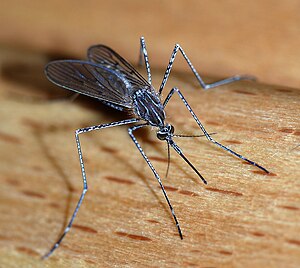 Image via Wikipedia
Image via Wikipedia
The mosquito plays an integral role in the transmission of heartworms. A female mosquito bites an infected dog and ingests microfilaria (immature heartworms). The microfilaria grow in the mosquito and when the mosquito bites a healthy dog, she transmits the microfilaria. It takes five to seven months for the microfilaria to mature into adult heartworms in the dog. At this time, the adult heartworms start producing microfilaria and the cycle continues.
Most dogs act normally and do not demonstrate any signs of heartworm disease for up to two years after infection. Unfortunately, by that time, irreversible damage has already been done. The worms interfere with the function of the heart leading to heart failure and subsequent damage to other organs. The signs of heartworm disease include a dry cough, weakness, shortness of breath, and exercise intolerance. Some dogs may even die suddenly during exercise or excitement.
A diagnosis of heartworm disease can be made early with the proper tests. Your veterinarian can run a simple blood test to determine if your dog is infected. This should be done on a regular basis to detect heartworms before extensive damage is done. If detected, heartworms can be treated, though treatment is expensive and requires hospitalization. The treatment consists of drugs administered at proper doses and time intervals to kill the adult heartworms and microfilaria. Rest is also a key factor in recovery. The success rate is high and even higher if the disease is caught early. As in many instances, the best solution to heartworm disease is prevention. Prevention is as easy as a pill given every month. With simple and affordable heartworm preventives available, no dog should have to worry about this potentially fatal disease. Talk to your veterinarian today.
Chad Smith, D.V.M
Check out these links to find out more information
Heartworms in Dogs: Facts and Myths
Heartworm Disease in Dogs and Cats
Heartworm FAQ
![Reblog this post [with Zemanta]](http://img.zemanta.com/reblog_e.png?x-id=afc86638-57b8-42af-9c6a-c546d558b42e)


No comments:
Post a Comment